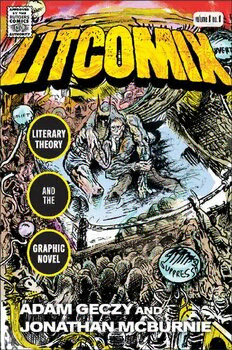
Litcomix: Literary Theory and the Graphic Novel PDF
Preview Litcomix: Literary Theory and the Graphic Novel
Litcomix Litcomix Literary Theory and the Graphic Novel ADAM GECZY AND JONATHAN McBURNIE Rutgers University Press New Brunswick, Camden, and Newark, New Jersey; and London and Oxford, UK Rutgers University Press is a department of Rutgers, The State University of New Jersey, one of the leading public research universities in the nation. By publishing worldwide, it furthers the University’s mission of dedication to excellence in teaching, scholarship, research, and clinical care. Library of Congress Cataloging- in- Publication Data Names: Geczy, Adam, author. | McBurnie, Jonathan, author. Title: Litcomix: literary theory and the graphic novel / Adam Geczy and Jonathan McBurnie. Description: New Brunswick: Rutgers University Press, [2023] | Includes bibliographical refer- ences and index. Identifiers: LCCN 2022019249 | ISBN 9781978828650 (paperback) | ISBN 9781978828667 (cloth) | ISBN 9781978828674 (epub) | ISBN 9781978828681 (pdf) Subjects: LCSH: Graphic novels— History and criticism. | Graphic novels— Social aspects. | Comic books, strips, etc.— History and criticism. | Comic books, strips, etc.— Social aspects. | Popular culture and literature. | LCGFT: Literary criticism. Classification: LCC PN6710 .G396 2023 | DDC 741.5/9— dc23/eng/20220421 LC record available at https:// lccn .loc .gov/ 2022019249 A British Cataloging- in- Publication record for this book is available from the British Library. Copyright © 2023 by Adam Geczy and Jonathan McBurnie All rights reserved No part of this book may be reproduced or utilized in any form or by any means, electronic or mechanical, or by any information storage and retrieval system, without written permission from the publisher. Please contact Rutgers University Press, 106 Somerset Street, New Brunswick, NJ 08901. The only exception to this prohibition is “fair use” as defined by U.S. copyright law. References to internet websites (URLs) were accurate at the time of writing. Neither the author nor Rutgers University Press is responsible for URLs that may have expired or changed since the manuscript was prepared. ♾ The paper used in this publication meets the requirements of the American National Standard for Information Sciences— Permanence of Paper for Printed Library Materials, ANSI Z39.48- 1992. rutgersuniversitypress .org Manufactured in the United States of America To Marcel, comix demon, and Suzi, for being the folio edition complete works of Ursula K. Le Guin to my ratty piles of coverless, moldering Jack Kirby comics Contents Introduction 1 Part I Theories 1 Literary Theory: The Relevant and the Real 21 2 Recuperating Realism: Lukács 33 3 Classic Novels, Classic Comics 49 4 Was Wertham Right? Comics as Antisocial and Subversive 65 5 The Balzac of Comics: Jack Kirby, World Building, and the Kirbyesque 83 6 Figurative Pseudonyms: Biography and Confession 105 Part II Case Studies 7 Josh Bayer 123 8 Nina Bunjevac 143 9 Simon Hanselmann 161 10 The Hernandez Brothers 177 vii viii • Contents 11 Tommi Parrish 197 12 Yoshihiro Tatsumi 215 Conclusion: Our New Urizens 233 Acknowledgments 237 Notes 239 Index 251 Introduction In the era of newsprint, they used to be called the funnies: these were what you removed from an insert in the newspaper on weekends. As a child, you may have been given a floppy, medium- format, folio- like book with the adventures of your favorite superhero: Batman, Superman, Wonder Woman. You may have remembered the smell of the paper and the clean glossiness of the cover that would slowly deteriorate as it passed through many hands. Later, in high school, you may have found, against your parents’ wishes, an illustrated storybook of a few famous works of Edgar Allan Poe or Charles Dickens. You may have been chastised, “Read the real thing.” If you are of a more recent generation, you may have not received the same reproach. And even if your English teacher may not have admired them, you had enough friends who agreed on the value of comics and their postmodern offshoot, the graphic novel. While you could see the inherent value of great literature, some of the best graphic novels spoke to you with a depth and sophistication that prompted reflection and wonder. In the hallowed halls of academia, it would have been unthinkable even twenty years ago to have in a litera- ture faculty an expert in graphic novels, no less than in the 1970s an expert on jazz in a music conservatorium. Now the prospect has become a lot less unthinkable and perhaps, indeed, a pressing question. Can there be a theory of the graphic novel that is commensurate with literary theory? This book answers with a resounding yes. 1
